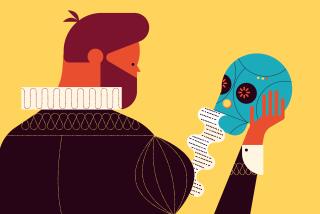Israeli Lightens Computer Research With Cartoonist’s Whimsy
- Share via
JERUSALEM — The computer experts made their big mistake, as Yakov Kirschen sees it, in not having Steven Spielberg and Woody Allen show them what computers can do.
“We’ve made these non-human intelligences boring,” Kirschen, the originator of Israel’s most popular cartoon strip, said the other day. “It’s like little green men came down from Mars and we said, ‘Hey! Let’s let them balance the checkbook for us!’ ”
It is the artist in Kirschen that is offended by what he sees as the computer industry’s lack of imagination, but Kirschen speaks from technical authority as well. He is not only a cartoonist but also a computer programmer and the man behind LKP Ltd., a softwear research and development company.
Entertainment Medium
He plans to turn the personal computer into what he says it should have been all along, an entertainment medium.
What Kirschen has in mind goes far beyond computer games. With the aid of artificial-intelligence programming techniques, he is creating computer personalities that one day, he said, will do everything from compose and play jazz to deliver William Shakespeare into the home “live” as a dinner companion.
Kirschen’s first products are “Murray” and “Mom,” computerized cartoon characters ready to chat--through words printed on the screen--with anyone who sits down at the computer keyboard. Kirschen calls them “Biotoons,” and the Antic software and publishing company recently introduced them on program discs in the United States.
Mom is the archetypal Jewish mother. She appears on the screen in an overstuffed chair, knitting, and she has a wide range of facial expressions .
Mom Inspires Guilt
“If there’s something wrong, she’ll be supportive,” Kirschen said. “If there’s nothing wrong, she’s going to make you feel guilty.”
Murray is a joker. In the course of a 60-second conversation, he said: “Are you sure I never told you about my Aunt Lucy? ‘Murray,’ she used to say, ‘you should have a nice day. But save some for tomorrow.’ Say, Dan, did I ever tell you about her husband, my Uncle Jack? He was always inventing things, especially ways to escape from Lucy. ‘A good day is a day away’ was his motto. And he was real successful at it. We haven’t seen him since 1979.”
Kirschen emphasized that his characters’ responses are not programmed. They depend on the intricacies of the computerized personalities he has created and the user’s input. He said he does not know how many different conversations might be possible with Murray or Mom.
Kirschen, a 47-year-old native of Brooklyn, seems to be the logical choice to give personality to the computer. His education--he studied fine arts and economics--is “probably an indication of my compulsive need to put seemingly incompatible things together,” he said.
Playboy and IBM
After college he worked simultaneously as a cartoonist for Playboy magazine and a programmer for IBM and NCR Corp. “It didn’t seem to me that I had two professions,” Kirschen said. “It just seemed to everyone else that I had two professions.”
In 1968, he was a delegate for Eugene McCarthy at the Democratic National Convention in Chicago. Three years later, he left for Israel because of “what was going on in America at that point.” Also, he said, “I’m very much into experiments, and Israel was a fascinating experiment of my (Jewish) people.”
From what he had heard, Israel was a country that needed computer experts. But, when he arrived, he changed his mind. “I found it was the kind of country that needed to laugh at itself and look at its foibles,” Kirschen said.
The result was “Dry Bones,” a popular Israeli cartoon strip in somewhat the same spirit as “Doonesbury” in the United States. To most of his friends, Kirschen is known simply as “Bones.”
Missing a Bet
He maintained his interest in computers, though, and became increasingly convinced that the industry was missing a bet.
“We have the opportunity and the ability to build things that are alive,” he said. “Every story writer and film director knows that, but the computer expert doesn’t. The computer person makes some dumb arm that picks up a glass; only the media person comes up with R2D2.”
At LKP Ltd.--the letters stand for “Latest Kirschen Project”--the atmosphere is purposely more recording studio than think tank. Sally Ariel, the general manager, is a painter and film director; the programmers include a movie cameraman and a musician.
“Everybody who works in this company comes in some way from the communications field,” Kirschen said. “We don’t want computer experts. We want students.”
Kirschen said his Biotoons are only the beginning, the Kitty Hawk of the coming jet age in computerized home entertainment.
“The crux of everything we’re doing is the creation of life in the silicon chip,” he said.
Kirschen is circumspect about much of his work, but one project, he said, involves the “digital production of music,” in which a computer, connected to the family stereo system, “will put together your music program for the evening.” It will be tied in with the family television set, and computerized figures might even dance across the screen in time with the music.






